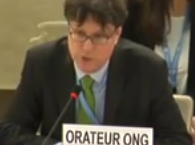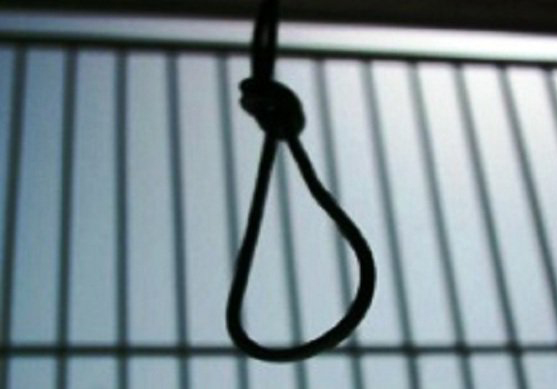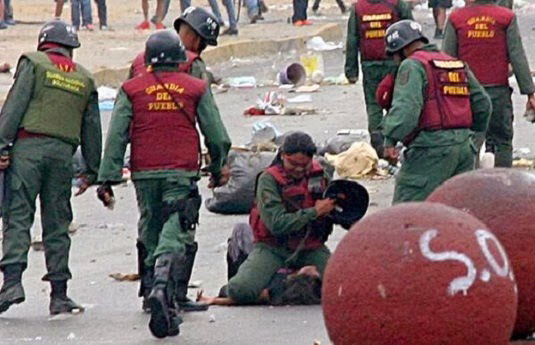
Mar 19, 2018 | Advocacy, Non-legal submissions
The ICJ today delivered an oral statement at the UN calling on Pakistan to amend or repeal blasphemy laws, end military trials of civilians, and take effective measures against impunity.
The statement was delivered during the adoption of the Universal Period Review Outcome for Pakistan, at the UN Human Rights Council. It read as follows:
“The International Commission of Jurists (ICJ) regrets that Pakistan has not supported recommendations related to amending its blasphemy laws, ensuring its counter-terrorism measures are compatible with human rights, and combatting impunity for serious human rights violations.
Pakistan’s blasphemy laws are frequently misused; blatantly discriminate against minority religions and sects; infringe upon the rights to freedom of expression and religion; and give rise to serious fair trial concerns. The Government has failed to amend them in accordance with its international law obligations.
In January 2015, Pakistan empowered military courts to try people accused of terrorism-related offences. The ICJ has documented serious fair trials violations in the operation of military courts including: denial of the right to counsel of choice; failure to disclose the charges against the accused; denial of a public hearing; and a very high number of convictions based on ‘confessions’ without adequate safeguards against torture and other ill-treatment.
The Government has also failed to take steps to combat impunity for serious human rights violations such as extrajudicial killings, enforced disappearances, and torture and other ill-treatment, which are facilitated by laws such as the Actions (in aid of civil power) Regulation and other national security legislation.
Despite repeated commitments to do so, Pakistan has also not enacted legislation to recognize torture or enforced disappearance as a distinct, autonomous offence in its penal code.
The ICJ therefore urges the Government to reconsider, accept and implement UPR recommendations to:
- Ensure that military courts have no jurisdiction over civilians, including for terrorism-related offences;
- Repeal or amend all blasphemy laws, in line with international standards; and
- Ensure all perpetrators of serious human rights violations – including enforced disappearance and extrajudicial killings –are brought to justice.”
Video of the ICJ statement is available here:

Jan 19, 2018 | News
The ICJ today condemned the executions of 22 civilians during the past month, following death penalty cases before military courts in which fair trial guarantees appear to have been flagrantly violated.
The Egyptian authorities should establish an immediate moratorium and halt all pending executions with a view towards the total and permanent abolition of the death penalty, the ICJ added.
“The executions of these civilians constitute blatant, egregious violations of the right to life by the Egyptian authorities,” said Said Benarbia, ICJ MENA Director.
“Carrying them out based on military trials, which furthermore failed to scrupulously observe international fair trial standards, amounts to the arbitrary deprivation of life,” he added.
Based on information provided by the defendants’ lawyers and families, Egyptian NGOs have reported a litany of fair trial violations that marred these proceedings.
These included the case of a defendant who was convicted following one trial session, in the absence of his counsel.
It also included instances involving enforced disappearances and allegations of torture and other ill-treatment, some of which were documented in the prosecution reports.
In one case the defendants’ lawyers filed a motion to “review the case” under article 448 of the Code Criminal Procedure which should normally suspend the carrying out of any sentence of execution.
The executions were nevertheless carried out on 9 January, before the Military Court’s review, which was due on 28 February 2018.
“The Egyptian authorities have brushed aside the most basic legal safeguards on the imposition and carrying out of the death penalty,” Benarbia said.
“Because they cannot ensure respect of fair trial rights, they must impose an immediate moratorium on executions.”
Under international standards, proceedings in death penalty cases must conform to the highest standards of judicial independence, competence and impartiality, and must strictly comply with all fair trial rights.
The ICJ has previously documented how the Egyptian judiciary fails to conform to these standards.
Contact
Saïd Benarbia, Director of the ICJ Middle East and North Africa Programme, t: +41.22.979.3817, e: said.benarbia(a)icj.org
Egypt-Executions-News-2018-ARA (Arabic translation in PDF)
Background
International standards recognize the particular concerns with judicial independence and impartiality that arise in relation to the trial of civilians by military courts.
Accordingly, the jurisdiction of military courts should be limited to military personnel in cases of strictly military offences, i.e. alleged breaches of military discipline.
The above-mentioned cases involved civilians and allegations of ordinary offenses, including theft, rape, and murder (including murder of military officers).
Particularly in these circumstances, there could be no justification for these cases to have been adjudicated before military courts and the ICJ considers that this factor in itself renders the executions in violation of the right to life.
The ICJ furthermore opposes the death penalty in all circumstances as a violation to the right to life and to the prohibition of cruel, inhuman or degrading treatment or punishment.
The cases in question were: Case No. 411/2013 before the Ismailiya Criminal Military Court (15 executions in 26 December 2017), case No. 22/2015 before Tanta Criminal Military Court (4 executions in 2 January 2018) and case No. 93/2011 before the Ismailiya Criminal Military Court (3 executions in 9 January 2018).

May 17, 2017 | News
La CIJ condena enérgicamente la violenta represión de las manifestaciones por parte del Gobierno venezolano y sus cuerpos de seguridad, así como el juzgamiento de civiles por tribunales militares de ese país.
Entre el 4 de abril y el 16 de mayo de 2017, han fallecido de manera violenta más de 40 personas en el contexto de manifestaciones, por la acción de los cuerpos de seguridad del Estado venezolano y grupos armados de civiles afectos al Gobierno.
Asimismo, centenares de personas han sido detenidas arbitrariamente, muchas de las cuales han sido trasladadas a prisiones militares, instalaciones de organismos de seguridad o a cárceles de máxima seguridad.
Numerosos detenidos han denunciado golpizas, tratos crueles e inhumanos así como actos de tortura.
Igualmente, por lo menos 275 civiles están procesados por tribunales militares, acusados de delitos previstos en el Código Militar, como los de “rebelión” y “traición”.
En muchos casos, a los abogados defensores se les limita el acceso a las salas de audiencia, sólo están autorizados a hablar uno pocos minutos antes de las audiencias con sus defendidos y se les restringe el acceso al expediente penal.
La CIJ recuerda que todas estas prácticas vulneran derechos y libertades fundamentales y constituyen una violación flagrante por parte del Estado venezolano de sus obligaciones constitucionales e internacionales de garantizar y proteger los derechos humanos.
Desde hace varios años la CIJ ha venido siguiendo la situación en Venezuela y ha podido constatar el vertiginoso y sistemático deterioro de los derechos humanos y de las libertades fundamentales, la pérdida de independencia del Poder judicial y, en general, el ocaso del Estado de Derecho.
Al respecto ver los informes de la CIJ: Fortaleciendo el Estado de Derecho en Venezuela (2014) y Venezuela: el ocaso del Estado de Derecho (2015).

Mar 30, 2017 | Advocacy, Non-legal submissions
Today, the ICJ made a submission to the Universal Periodic Review of Pakistan.
The submission brings to the attention of the members of the Human Rights Council’s Working Group on the UPR issues concerning:
- Trials of civilians by military tribunals;
- Enforced disappearances;
- Torture and other ill-treatment;
- Blasphemy laws; and
- International human rights instruments.
With respect to each of the above-mentioned concerns, the ICJ calls upon the Working Group on the UPR and the Human Rights Council to make a number of recommendations to the Pakistani authorities.
Pakistan-ICJ UPR-Advocacy-non-legal submissions-2017-ENG (full text in PDF)

Mar 28, 2017 | News
Legislation adopted today by the Pakistani Parliament allowing civilians to be tried by military tribunals in secret proceedings is a serious blow to human rights and rule of law in the country, the ICJ said.
“The nationwide concern at a number of recent attacks in the country seems to have once again been misdirected toward a seriously flawed counter terrorism strategy that weakens the rule of law and the struggle for justice,” said Sam Zarifi, ICJ’s Asia director.
“Pakistan must reject this counter productive strategy and instead strengthen its judicial process and law enforcement in line with its domestic law and international obligations,” he added.
The Pakistani Parliament voted to amend the 1973 Constitution and the Army Act, 1952, to again allow military tribunals to try civilians who allegedly belong to “a terrorist group or organization misusing the name of religion or a sect” and are suspected of committing a number of offences, including: abducting any person for ransom; raising arms of waging war against Pakistan; causing any person injury of death; using or designing vehicles for terrorist attacks; creating terror or insecurity in Pakistan; and attempting, aiding or abetting any of these acts.
The use of military courts to try civilians is inconsistent with international standards.
The ICJ has also documented serious fair trials violations in the operation of military courts from January 2015 to January 2017, including: denial of the right to counsel of choice; failure to disclose the charges against the accused; denial of a public hearing; failure to give convicts copies of a judgment with evidence and reasons for the verdict; and a very high number of convictions based on “confessions” without adequate safeguards against torture and ill treatment.
“Militarizing the judicial process will not lead to justice and it will not effectively counter terrorism; this is the lesson from around the world,” Zarifi said. “It has not proven to do so in Pakistan in the past, and there is nothing to indicate that it will do so now.”
“Instead, secret military trials of civilians that flout even basic fair trial guarantees will further erode the rule of law and weaken the government’s role in providing justice and protecting the rights of people in Pakistan,” he added.
Contact
Sam Zarifi, ICJ Asia Pacific Regional Director (Bangkok), t: +66 807819002; e: sam.zarifi(a)icj.org
Reema Omer, ICJ International Legal Adviser for Pakistan (London), t: +447889565691; e: reema.omer(a)icj.org
Background
Military courts constituted under the 21st Amendment convicted 274 people in the two years during which they were in operation, from 7 January 2015 to 6 January 2017.
Of those 274 convictions, 161 people were sentenced to death and 113 people were given prison sentences. At least 21 people given death sentences have been executed by hanging.
The enabling legislation for these courts lapsed on 6 January 2017 pursuant to a two-year sunset clause.
The ICJ opposes the use of the death penalty under any circumstances as a violation of the right to life and freedom from cruel, inhuman or degrading treatment.









